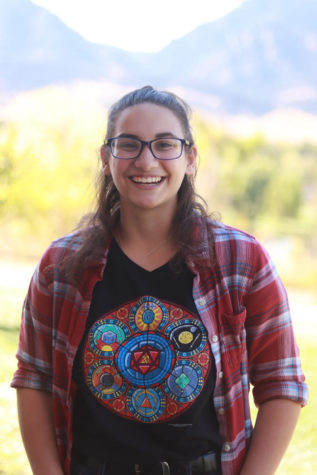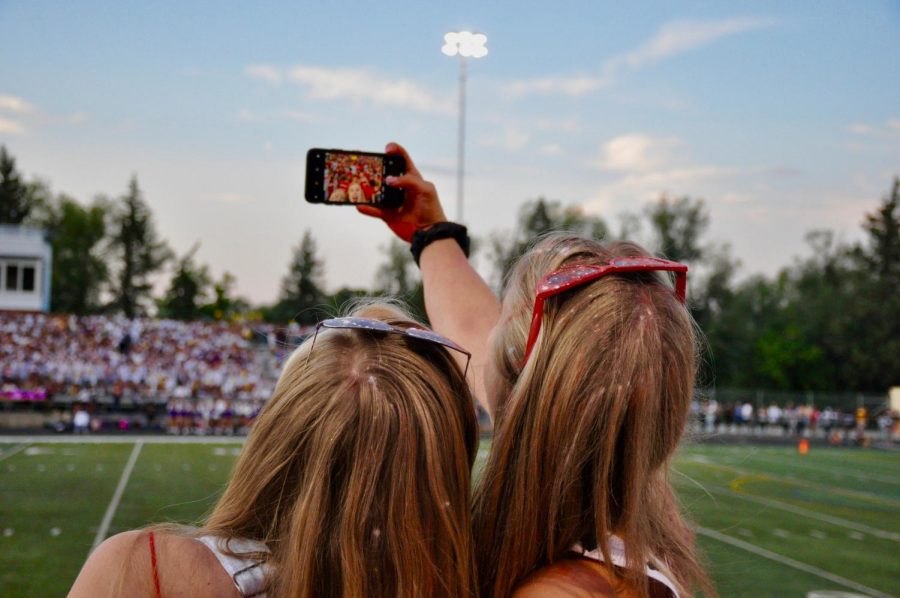BVSD Rolls Out New Cell Phone Policy
Two students take a selfie at the Boulder-Fairview game in August.
When it comes to phones, teachers’ policies vary drastically.
“So many different teachers have so many different policies. And I think students and parents just want clarification,” said social studies teacher Susan Eide-Stenstrud.
Some teachers want students to put their phones away for the entire period, while others often utilize them as learning tools. A few teachers even have students placing their phones in holders at the front of their classroom.
This lack of consistency among the phone policies led the district to change their official technology policy. Kathy Gebhardt, Vice President of Boulder Valley’s School Board, described the reasoning behind the change.
“We just wanted to make sure we were really clear on what the policies were. So it’s more of a clarification than a lack of having a policy before,” Gebhardt said.
Students, teachers and parents can find the exact policy in the BVSD student handbook, accessible through BVSD’s website.
The new policy states, “At high schools, students with cell phones or other personal technology devices (PTDs) must keep their PTDs turned off and away during class periods unless specifically directed to do otherwise by a school employee. Violation of this regulation may result in temporary confiscation of the PTD by school staff […] Students who require a PTD as part of accommodations specified in their 504 plan or Individual Education Program (IEP) will be allowed access to their PTD as described in their 504 plan or IEP.”
The policy is slightly different for elementary, middle and high school students, which is a change from the old policy.
“We didn’t really have a policy that differentiated like that through levels,” said Gebhardt.
Teachers also have opinions on the new policy. Eide-Stenstrud discussed how the policy would not have too big of an impact on the way she handles phones.
She said, “I essentially follow that policy in my classroom. I just don’t need anyone to tell me that.”
Science teacher Kristy Campbell had a similarly positive reaction to the policy.
She said, “I feel great about it, cause I think that, even […] when people put them in the holders in my room, sometimes they flash and beep, and then it’s still being distracting. So if they’re off, then it’ll just be less of an opportunity for a distraction.”
It is important to note that the phone policy isn’t the only policy the board will be reviewing and modifying.
“For the first time since I’ve been on the board and that I know of, our board is going through every single policy that the district has. It’s gonna take us a few years, cause we only meet twice a month, but we’re updating every single policy,” said Gebhardt.
She explained that this massive project was prompted by the board president, who decided it would be a good idea to update the policies. In addition, the board is a “policy governance board,” which means that they are only supposed to set the policies, and it’s up to the superintendent, principals and administrators to actually implement them. Because of this, the board wanted to be sure they had good policies to be implemented.
Students or teachers who would like to stay informed about the changing policies can also find that information in the BVSD student handbook linked above.
The student handbook is not set in stone, and the board is willing to shift based on the feedback they receive from the community.
Gebhardt said, “Our policy may need to be revised after a year if we get feedback from students, and from families, and from teachers.”
Members of the public are able to give their feedback by coming to the board meetings and speaking during the time set aside for comments from the public. They can do this by first calling the board secretary at 720-561-5114 to sign up for a time slot, then showing up for their time. Additionally, people can email their feedback to the board secretary at [email protected].
“We’re always open to that,” said Gebhardt. “In fact, we welcome that.”
Your donation will support the student journalists of Fairview High School - CO. Your contribution will allow us to purchase equipment and cover our annual website hosting costs.

This is Tessa Moskoff's fourth year as a reporter for the Royal Banner. In her free time, she enjoys fencing, reading, and writing. She is excited to continue...

Jillian is a sophomore. This is her first year on the Royal Banner. She likes to read, write, and play piano. Jillian is excited to write articles for...

Henry loves telling stories. Mainly, that means he produces podcasts, which you can check out here. When he isn't doing something related to journalism,...







